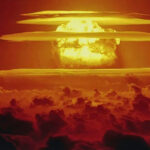by Fabio Bozzo
What is democracy
Democracy as we understand it today (not that of Ancient Greece, which was a different matter) has its roots in the 1215 England, when the nobles of the Kingdom imposed the Magna Carta Libertatum on King John I Landless. It was not a kind of constitution, but a document that imposed limits on royal power over his most important subjects.
At the time, it was a momentous revolution. From that time on, English history was a continuous contrast between parliamentary and monarchical power, which, through ups and downs, reached its epilogue in 1689, the year of the Glorious Revolution and the Bill of Rights: England became a constitutional monarchy from then on, and over the next hundred years its sovereigns became increasingly representative figures, respected to the limits of veneration, but lacking real power.
With the American Revolution, British colonists in the New World created the United States. The new country had a purely British political-legal structure, but it was devoid of European feudal traditions. Therefore it could develop a democracy even more representative than that of the old mother country.
West means democracy
From then on, history accelerated. The French Revolution tried to emulate the positive innovations of the American Revolution, but drowned the good premises in the blood of the guillotine and state massacres (Vendée and beyond). The result was Napoleon's military dictatorship and an expansionism that bloodied Europe, eventually defeated France itself and provoked the Restoration.
But not all the message was lost. If the transalpine leadership's delusions severely damaged the cause of Liberty and Rights, the seed of the principle of equality among men was scattered across Europe by its armies, albeit amid the shames of plunder and imperialist arrogance. That seed would take root and explode in 1848, the year in which nearly all of Europe was shaken by a revolutionary whirlwind that revived the ideals of Liberté, Egalité, Fraternité. In a word: democracy. Of course, each country evolved in its own way the government through popular representation (and the too often vituperated "liberal Italy" in this field was one of the best successful models, whatever one may say), but since then the democratic system has only expanded, becoming almost synonymous with the West.
The challenge with fascism and communism
For democracy, World War I ended in a draw: on the one hand, the principle of monarchy by divine will was put permanently in the museum of history and (more or less) democratic countries multiplied; on the other hand, the former tsarist autocracy collapsed, but Russia failed to solidify its very brief democratic experience. Indeed, the great Eastern country fell under the gloomy communist dictatorship, which would spread blood and terror to the four corners of the globe for the next seventy years and cause in the Russian people a collective economic and psychological backwardness, of which Putinism is only the last and not the most serious gasp.
And since in both good and bad every action is matched by a reaction, the failed attempt at world revolution launched by Lenin was followed by the emergence of the first fascist regimes. In this area, too, Italy acted as a vanguard. Although fascism was not a coherent ideology (each country that experimented with it characterized this in its own way) it nevertheless had two cardinal points: the denial of free elections and the curtailment of economic freedoms, the latter more or less reduced in favor of statist dirigisme.
But the worst was yet to come. The 1929 Great Depression (an inevitable consequence of World War I) destroyed much of the credit democracy enjoyed in Europe. The result was the rise of Nazi Germany and the multiplication of fascist regimes. In France itself, democracy on more than one occasion was short of breath, although it always managed to survive in the end, paradoxically also thanks to a polity so fragmented that it denied any potential dictator sufficient critical mass.
In short, on the eve of the Second Conflict, the representative system was threatened by the dictatorships of the left and right, which through clever propaganda appeared more stable and efficient. This three-way game led to World War II, in which Nazi-fascism forced the democracies and the Soviet Union into an unnatural but successful alliance. Victory was followed by the substantial annihilation of fascism as a system of government and a consequent advance of communism, seen by many as the Sol dell'avvenire, and of democracy, which in the most terrible of human conflicts proved that it could pull out its teeth and renew itself without betraying its principles. The Cold War froze that situation for the next forty-five years, until communism collapsed under the weight of its own inhumanity.
A broken dream
The ten post-1991 years were a dream time for the West. The entire planet seemed to embrace the ideals of political and economic freedom, everyone competed to appear as Western as possible, and Western-based supranational organizations experienced unprecedented expansion. Of course, as in all too idyllic dreams, a rude awakening followed.
The Third World (an antiquated but concrete term) masses have never really assimilated democracy, for the simple reason that it is alien to their history, particularly in the Islamic areas of the planet. In Russia, the noble political season inaugurated by Boris Yeltsin has, for various and complex reasons, suffered an authoritarian setback under Vladimir Putin. Finally, China has consolidated a regime based as much on the ideology of communist dictatorship as on Confucian millenarian pragmatism.
Western democracies, meanwhile, appear tired, inefficient in the eyes of both their own citizens and foreigners, sclerotized by a hypertrophic bureaucracy and terribly inconsistent in foreign policy. Let us give a few examples. The democratic and capitalist system has made Westerners (especially "acquired" ones like the Japanese) materially wealthy and politically free like no other in human history. This state of affluence has lasted basically since 1945, which means that today we are in the third generation of Westerners who have not had to fight to safeguard their way of life. This has caused too many people today to believe that such a model is taken for granted, when in fact it is threatened from without and since '68 also corroded from within.
The challengers
Instead, the Chinese dictatorship, through skillful propaganda and fierce censorship, shows the world its most virtuous aspects: exponential economic growth, bureaucratic efficiency and political stability. The free world's leadership knows full well that China's reality is far less rosy, but the common man often has no time to delve into world dynamics, with the result that he becomes easy prey to the seduction of authoritarianism.
In this we have Putin to thank. The president-dictator for years has been a winning model, an objective restorer of the Russian state and an example for all those Westerners who, while sincerely loyal to democracy, wished for its renewal on a more efficient and decision-making basis. With the invasion of Ukraine much of the Putinian bluff has come out in the open. Without diminishing some of the objective achievements of the novice Czar, Putin's regime has proven itself corrupt to the hilt, economically in disarray, governed more by apathy than by the support of the population and, the ultimate snub, able to deploy armed forces more akin to those of Italy in the Greek Campaign than to those of Germany in the French Campaign. The Ukrainian debacle therefore will not only be preparatory to Putin's probable downfall, but is above all a balm to those who naively hope for the strongman of the day.
Nevertheless, Russia, whether Tsarist, Soviet or Putinist, remains a European country, however contaminated by the Asian despotism brought by the Mongols and renewed with communism. For this reason, the Russians, despite the fact that history has continually condemned them to political-economic backwardness, follow essentially Western social and geopolitical dynamics. This gives hope that, with the interlude of an expiring Putin over, Russia will experience a new and better season of integration with the democratic West.
China is a different matter, a world apart having logical and psychological parameters different from ours. Such mental distance did not even exist with the Soviets in the darkest days of the Cold War. Powerful, burstingly grown under all parameters in just forty years, inevitably the Beijing regime tantalizes the repressed dreams (or rather nightmares) of the Western losers of the 20th century, that is, the orphans or presumed orphans of the fascio-communist ideological failures. These, whose geopolitical thinking is limited to the two-dimensional "good or bad" intellect, see China for what it is: the latest ideologically structured dictatorship that concretely threatens democracy. All seasoned with puerile and mannered anti-Americanism. Of this the Beijing leadership is not guilty; it plays its game and legitimately pursues its power politics. At most one can criticize the current Lord of the Forbidden City for abandoning the Confucian strategy of long-term policies, but even this may have its own logic.
Will the West heal from decadence?
Today, the West is muddied and debilitated from within as never before. Democracy is in crisis almost everywhere, corroded by political correctness that has largely crossed the boundaries of insanity, castrated by inefficient bureaucracies and even blamed for being invented by the white man (the latter being the main target of Third Worldist nihilism). How long will this collective delusion aimed at the self-destruction of the West last? No one knows, not even Xi Jinping. Who, on the other hand, knows well that a united West, proud of itself and its history, would be unbeatable even for a China that has returned to being the Middle Empire. Better therefore to advance and take geopolitical risks now, before the enemy recovers from its self-destructive delusion.
This brings us to the essence of our brief analysis. Democracy and capitalism are consubstantial to Western Civilization. That Civilization has overcome terrible historical trials and defeated formidable enemies, so it cannot be ruled out that it can and must also overcome the current phase of objective decline. How? By studying more such figures as Octavian Augustus, Charlemagne, Lincoln and Churchill, as well as thinkers such as Machiavelli and Locke, instead of pursuing the neo-1968 delusions of Black Lives Matter and White Guilt.
Graduated in History with modern and contemporary majors at the University of Genoa. Essayist, he is author of Ucraina in fiamme. Le radici di una crisi annunciata (2016), Dal Regno Unito alla Brexit (2017), Scosse d'assestamento. "Piccoli" conflitti dopo la Grande Guerra (2020) and Da Pontida a Roma. Storia della Lega (2020, with preface by Matteo Salvini)









Scrivi un commento